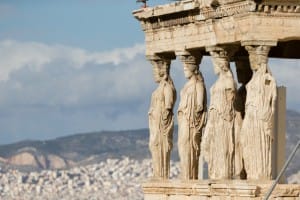How Anti-Trade Nativism Wrecked the Ancient Greeks
“How Anti-Trade Nativism Wrecked the Ancient Greeks,” The Wall Street Journal, May 22, 2016
——
How Anti-Trade Nativism Wrecked the Ancient Greeks
Cleon was an Athenian demagogue, a shrewd operator known for violence and for getting things done.
Today’s presidential candidates are playing recklessly with free trade, alliances and immigration. They are pushing the misguided notion that high trade barriers will restore jobs and prosperity to the middle class, and scorning old alliances and new immigrants. These protectionist and nativist ideas aren’t new; they’re as old as the Greeks. Athens tried them but it created international disorder and the opposite of the desired result.
While nationalism will always be fodder for politicians, today’s leaders need to understand the consequences. Athens learned the hard way. Here are the lessons:
 The story begins about 2,500 years ago with an alliance between Athens and the Greek city states of the Aegean. Historians usually call it an empire, but it was more like a cross between the European Union and the Warsaw Pact. It was meant to protect Greece against Persia and it succeeded so well that it left some allies complaining it had turned into a protection racket in which they were bullied into playing along but got nothing in return. Athens didn’t allow allied exits and backed up its position with force.
The story begins about 2,500 years ago with an alliance between Athens and the Greek city states of the Aegean. Historians usually call it an empire, but it was more like a cross between the European Union and the Warsaw Pact. It was meant to protect Greece against Persia and it succeeded so well that it left some allies complaining it had turned into a protection racket in which they were bullied into playing along but got nothing in return. Athens didn’t allow allied exits and backed up its position with force.
At first, things worked smoothly. Athens slowly turned the alliance into a common market in which Athenian coins, weights and measures became the norm, a kind of ancient euro. Athens’s free-trade zone fostered prosperity, democracy and the soaring confidence that built the Parthenon and fired the Golden Age of Greece.
Athens also had a magnetic appeal to immigrants. They came from far and wide and represented rich and poor. Immigrants competed with natives for jobs but not for political power since they were rarely allowed to become citizens.
Then came the backlash. Three disturbing developments took place.
Nativism. Athens’s old landed elite disliked democracy and despised the immigrants. So, when extreme conservatives seized power in a coup d’état after Athens lost the Peloponnesian War (431-404 B.C.), they evicted immigrants from the city limits and targeted the wealthiest for murder and property confiscation.
Fortunately, the coupmakers didn’t stay in power long. An armed uprising, funded and manned partly by immigrants and slaves, defeated the usurpers and restored democracy to Athens. But the coup shows that even the most open society is vulnerable to nativist and anti-immigrant sentiment.
Demagoguery. In Athens, for the first time in history, demagogues emerged. They were popular leaders of unrestrained vulgarity and crassness. They shouted, used abusive language, and instead of keeping their hands modestly tucked inside their cloaks, they raised their garments and introduced hand gestures into oratory. Although wealthy and well educated, they spoke in populist accents and criticized the establishment.
The biggest demagogue was the Athenian general Cleon, described by fellow general and historian Thucydides as “the most violent man in Athens.” Maybe, but Cleon was also a shrewd operator with a reputation for getting things done. He attacked elites, especially intellectuals, and the crowds cheered. Although some of his initiatives fell flat—including the plan to execute everyone in Mytilene whether or not they had taken part in a rebellion against Athens—he remained popular and successful overall until he fell in battle with the Spartans (in Athens even demagogues died with their boots on).
Endless conflict. Athenian foreign policy should have built an international order that shared prosperity and encouraged allies to stay loyal. Instead, it chose Athens First.
Like Brussels in today’s EU, Athens became a supercapital. But it made the mistake of trampling on local rights. Athens mandated, for example, that major court cases be heard there rather than in the allies’ home city states such as Lesbos, Naxos or Miletus. Athenians also threw their weight around abroad and bought up property that was supposed to be for locals only.
Allied elites burned with anger that makes today’s Brexit fever in the U.K.—in favor of Britain leaving the EU—look like a sniffle. Therefore many of those allies threw in their lot with Athens’s rival, Sparta, even though Sparta was an economic backwater.
Athens had given people an impossible choice: prosperity or freedom. In the end, all they got was the more than quarter-century-long Peloponnesian War, the ancient Greek equivalent of our world wars. The long struggle weakened all of Greece but especially Athens, which by 404 B.C. lost its alliances, its ships and its prosperity.
Fast forward to today’s world. As in the past, Americans face a choice. We can erect trade barriers and build walls—and stoke bad will among nations. Or we can continue on the road to peace and prosperity by maximizing free trade in goods, ideas and people (vetted for national security) while offering a plan to bring back prosperity for those in need without re-erecting trade barriers.
Our leaders need to make the case for the second path, clearly and fearlessly. In short, we need smart, tough and responsible leadership. Otherwise, make way for Cleon—demagogues, nativists and protectionists who risk stoking a new conflict. That could make the Peloponnesian War look tame by comparison.